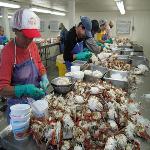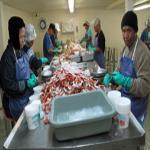04 June 2010

Photo: VOA - A. Boiko-Weyrauch
Von Wesson (middle, in blue cap) and her fellow workers are paid by the pound of crab meat they clean from the shells. With fewer crabs coming in, they're earning less money.
With the Gulf of Mexico still closed to fishing due to the massive oil leak, workers in the seafood industry have been hurt all along the southern coast of the United States.
A large portion of workers in Alabama's seafood capital originally hail from Southeast Asia, and they face cultural barriers that make coping with the disaster even more difficult.
Long process
It's 6:45 a.m., and hundreds of people are lined up in front of BP's compensation office in the small Alabama town of Bayou La Batre.
They are filing claims of lost income so they can get $5,000 from the giant oil company to pay their bills.
The air is humid and a breeze rolls in from the sea.
Sue Athanasay brought her grandkids and some plastic chairs to sit in while they wait. It's a long wait. They got in line at four in the morning and the office won't open until seven.
Athanasay, originally from Laos, plans to file paperwork for her pregnant daughter, who works in a crab processing plant.
A one-third of residents in Bayou La Batre is from Southeast Asia. Many of them work processing seafood caught in the Gulf of Mexico. In a refrigerated workshop, employees from Laos and Thailand in blue aprons crack crab shells over and over for up to 12 hours a day.
Lost income
Von Wessen, who came to Alabama from Laos when she was three years old, explains that processing the seafood is a skill.
"You have to learn it because if you don't do it right you'll have a lot of bones and a lot of broken pieces."
She and the other workers are paid by the pound of crab meat they clean from the shells, not by the hour. With fewer crabs coming in, it means less money for them.
"This is like our peak season," she says, "so usually we'll be working a full day. And we're only working a few hours, like five or six hours. So it's cut our income down significantly."

VOA - A. Boiko-Weyrauch
Employees, many from Laos and Thailand, crack crab shells for up to 12 hours a day in Bayou La Batre, Alabama.Language barrier limits opportunity
With income down, many are applying for compensation from BP, or signing on to help clean up the oil spill.
But all the forms and training are in English, so Wesson and her peers have been translating more and more for older members of the community. "In one way or another, they've helped me throughout the years, so I don't mind helping them back," she says.
Many immigrants on the coast struggle to communicate in English.
Dr. Nguyen Dinh Thang heads Boat People SOS, an organization that advocates for Southeast Asians in the United States.
He says a lot of people who fled here after the Vietnam War eventually ended up in the seafood industry on the Gulf of Mexico.
"They figure out that this is among the very few jobs that they can find employment in," says Thang. "Because they don't speak English that well and therefore they don't have too many choices."
Thang points out that poor English skills make it harder for Southeast Asian immigrants to leave town and transition into other jobs.
"They may not even qualify for job training programs and placement programs and most of them don't have any relatives around here or across the country so most of them are kind of stuck here."
Bleak outlook
Kimchi Thai is facing that bleak prospect.
She came to the U.S. from Vietnam 19 years ago. She works on her uncle's shrimping boat, supporting her children and her mother. Now, with no fishing allowed, she is out of work.
Thai doesn't know how to keep going when most of her knowledge revolves around seafood and the ocean. She wants to know how is she supposed to find another job with no other skills.
Thai says all she can do is just wait to see if help will come. She filed a compensation claim with BP, getting a friend to help her with the English-only forms.
Uncertain future
The U.S. seafood industry has been declining for a number of years now, according to Thang of Boat People SOS. He says competition from imported seafood and rising fuel costs have made it harder and harder for people to make a living from the ocean.
"This catastrophe expedites that process," he says. "We've been thinking of finding alternatives to jobs in the fishing industry. We haven't found the solution yet but we've been working on it even before the oil spill."
Back in the crab factory, Von Wesson slices into a small red crab with a sharp knife and hopes for the best. "With the oil spill, we don't know the effect of it yet. It's not like a hurricane, you know, you get to see the effect right away. It might affect us for years and we just don't know it yet."
For many workers, the only choice is to wait and see what happens. Right now, the future and livelihoods of this community are as murky as the crude oil flowing into the Gulf of Mexico.